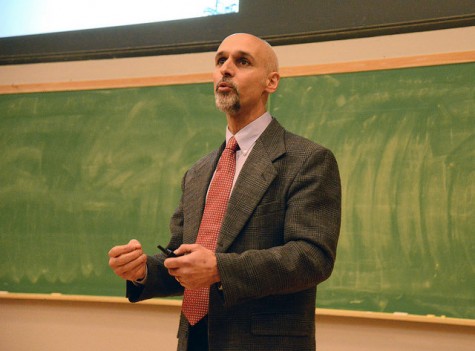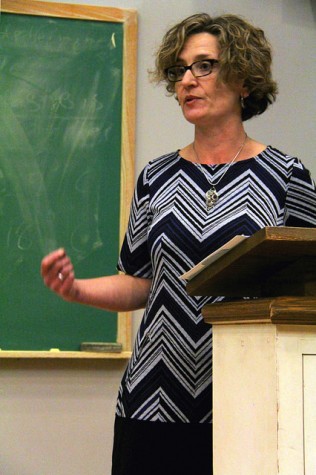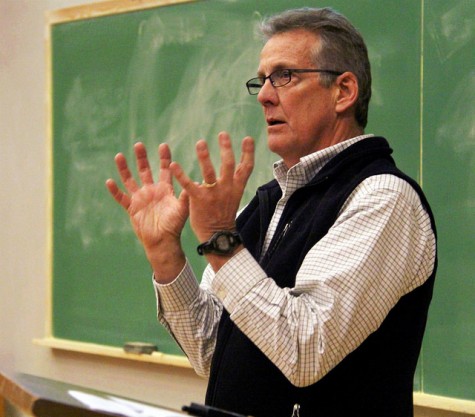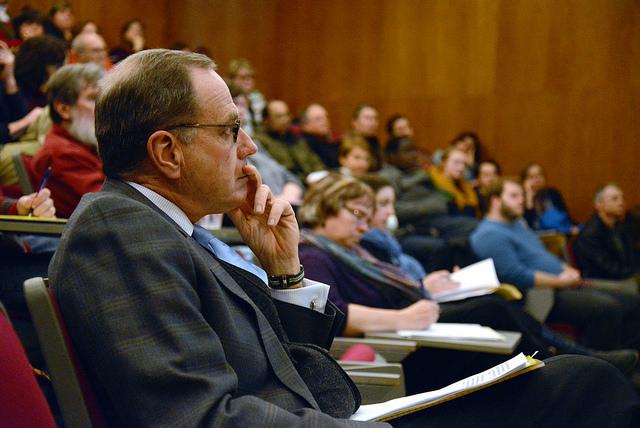Provost candidates present ideas for upcoming year
President Mullen introduced each candidate prior to their presentations Jan. 26-28. He prompted them to speak about the challenges and opportunities within Allegheny’s academic setting
Provost candidates Ron Cole, professor of geology, Scott Wissinger, professor of biology, and Sharon Wesoky, professor of political science, gave presentations Monday Jan. 26 through Wednesday Jan. 28, respectively, on the challenges and opportunities in Allegheny’s academic setting.
Each candidate presented their ideas for about 20 minutes, then answered audience questions for the next 30 minutes. Students, staff and faculty were all in attendance at Quigley’s Henderson Auditorium, almost filling every seat.
Linda DeMeritt, the current provost and dean of the college, is Allegheny’s chief academic officer who works with President James Mullen and other faculty members to shape the college’s academic program.
DeMeritt began her appointment as dean of the college in 2003 and will conclude her tenure at the end of the 2014-2015 academic year.
“She’ll conclude an extraordinary tenure as provost,” said Mullen. “Fortunately we’ll have some time to work to have conversations with the new provost on the issues.”
The next provost will be announced this semester. Mullen explained that there is not a specific date to finalize the process.
“We’re going to have a process now of allowing the community to reflect on what they’ve heard and the conversations that happened,” said Mullen. “I’m going to take some time and have some conversations with the candidates and come to the best decision. I don’t have an exact date for you but certainly understand that this is an important decision.”
In the fall of 2014, students were informed, through a campus-wide email, that a search for the new provost would be taking place into the spring semester. Mullen explained that an internal search for the next provost would best suit Allegheny’s needs.
“…we need a provost who is deeply connected to our culture and values,” wrote Mullen in an email on Oct. 2, 2014. “I am convinced that we will be best served by a colleague who has lived the Allegheny experience and whose leadership will grow from the deep awareness and commitment that comes with that experience.”
In addition to explaining the importance of searching within the college, Mullen also wrote that every campus constituency would have a voice in the selection process.
Ron Cole

Professor Ron Cole presents his plan as a potential provost to students, faculty and staff.
Following his formal education at the University of Rochester, Cole, a 1987 Allegheny alumnus, returned to his alma mater in 1994 as an assistant professor of geology and has been teaching at the college for the last 20 years.
To Cole, one of the most important aspects of the provost’s position is their role in the community.
“We need to have a community with ongoing education about what it means to be a strong community and I think we’re on the right track for doing this,” said Cole in his presentation Monday, Jan. 26. “We need to build community to provide access and success for these students.”
Cole also mentioned the importance of maintaining a strong and welcoming community in his letter of interest for the position.
“Allegheny is often cited by prospective students and new employees as a welcoming and friendly place and we should ensure that this is consistently true,” wrote Cole. “…without a strong community, other priorities cannot be as effective.”
Other than community, the other topics Cole prioritizes as integral to shaping Allegheny’s future in his letter include teaching and learning excellence, integrating academics with the Gateway, curriculum, student retention and advising, staffing plan and explore shared resources. Cole also brings to attention the under enrollment of the class of 2018.
“An immediate challenge for the next Provost is to advance our priorities while navigating the five year budget impact of the smaller class that matriculated in fall 2014,” wrote Cole. “…it is time to re-evaluate, prioritize and even modify the plan as needed, particularly in our current fiscal climate. A strategic plan needs to be nimble and adaptive and as we approach the mid-term of our plan, this is an ideal time for review.”
To Cole, the provost is a position to not only help shape academic goals, but to measure how those goals are being achieved.
“In closing, I’d like to share that I’ve never quite viewed myself as a leader, yet through my career at Allegheny I have found myself elected into or asked to serve in leadership roles…I would not be writing this letter if I was not fully confident with my ability to serve in this role.”
To see Cole’s presentation or read his letter of interest, visit: sites.allegheny.edu/provostsearch/
Sharon Wesoky

Professor Sharon Wesoky presents her plan as a potential provost to students, faculty and staff.
Since joining the Allegheny staff in 1998, Wesoky has been a professor in multiple departments at the college, including political science, Asian studies, Chinese studies and women’s studies.
Being a firsthand example of multifaceted teaching, Wesoky emphasized the importance internationalization, integrative learning and interdisciplinary in her presentation on Wednesday, Jan. 28.
“Studying economics might help you understand why there is not yet a cure for diseases like Ebola, while someone in global health can explain why there absolutely should be one and someone in biochemistry will have the skills to go out and invent it,” said Wesoky. “Studying political science can help you understand the value of freedom of speech, while studying religious studies, history or mastering a foreign language can help you understand that just because you can say whatever you’d like in some societies, doesn’t necessarily mean you always should. A psychologist might tell you why some people resist vaccinating their children, but it takes a biologist to clearly explain why these days, if you are going to Disneyland, you really shouldn’t plan on giving Mickey a hug. Considering these sorts of relationships can help us clearly articulate why interdisciplinary approaches are important to all of our students.”
She not only stressed the importance of a variation in academic life but how relationships also foster learning.
“It is the quality of our personal relationships that lead to meaningful and fulfilling lives,” said Wesoky. “It is the quality of our communities that lead to a robust and healthy democracy, and it is the quality of our interactions with our students that lead to their academic successes.”
In her letter of interest, Wesoky presented ideas she considers integral for the future of the position.
“Part of the next Provost’s task should also be to consider integrative ways of accomplishing our institutional goals so as to allow all members of the College community to embody a genuine work ethic, able to fully dedicate our attention to each other and to our work more generally.
To see Wesoky’s presentation or read her letter of interest, visit: sites.allegheny.edu/provostsearch/
Scott Wissinger

Professor Scott Wissinger presents his plan as a potential provost to students, faculty and staff.
After earning his doctorate at Purdue University, Wissinger began teaching at Allegheny College in 1986 as an assistant professor of biology and environmental science.
According to Wissinger’s letter of intent, the priorities of the next provost should include managing and minimizing the shortfall of enrollment, implementing and assessing the strategic plan, finding resources and upholding the honest culture among staff.
“The ‘internal challenge’ for the next Provost is, in my opinion, the size/scope of the job,” wrote Wissinger.
To Wissinger, it’s not the individual aspects of the job that makes the provost position a challenging one, but it’s the culmination of and the entirety of the job.
“My understanding of the provost and chief academic officer is to coordinate and manage and make sure that the academic platform is running,” said Wissinger during his presentation on Tuesday, Jan. 27.
During his presentation, Wissinger mentioned the importance of relationships in a job of this scope.
“It strikes me that one of the natural consequences of working with a group of people who are really smart and convicted to knowing what’s right and wrong…that’s why working with faculty, and I’ve worked with faculty my whole life, is such a visceral process,” said Wissinger.
Wissinger also brought up the topic of Allegheny’s undervalued image.
“The truth is that this college is better than it’s ranked,” he said. “My biggest frustration at being at Allegheny has been that I know, I know the liberal arts colleges, I’ll just be arrogant and say that…I’ve been in and around liberal arts colleges my whole life. I grew up on one of those campuses and I always thought that we were undervalued…when I go and do consulting work…I don’t see faculties and I don’t see programs and I don’t see infrastructures any better than ours and they’re often not as good and they’re ranked better than we are.”
Wissinger was adamant during his presentation about Allegheny’s opportunities for improvement and success in the realm of liberal arts education.
To see Wissinger’s presentation or read his letter of interest, visit: sites.allegheny.edu/provostsearch/









